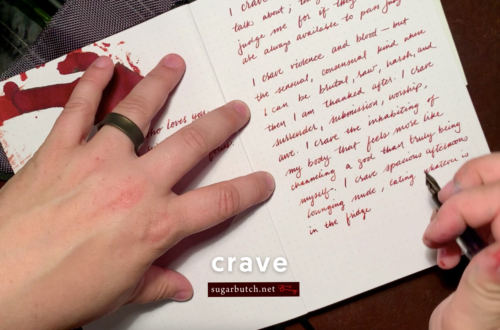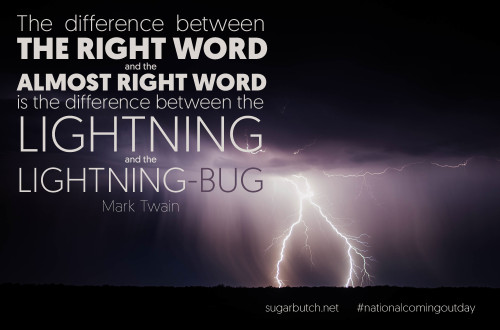Back in September, I asked for a word for someone who accepts chivalry. We had a lively discussion in the comments about what that person would be called.
It’s a very specific skill, really. Not everybody knows how to move when someone else is pulling out your chair, slipping your jacket onto your shoulders, how to navigate a door being opened for you, how to wait until the car door is unlocked. It takes a lot of consciousness about what is happening around you, and between you and the chivalrous person.
Many folks liked “gracious” as a word to describe those who receive chivalry, but I feel like it’s not specific enough. It has another definition and commonplace usage in our culture, so the word wouldn’t stand out as being used with this intentional meaning in conversation.
Which is why I really like the word “courtly.” (Thanks to Femme Gender for suggesting it!)
Court·ly: adjective.
Receiving chivalry and politeness with graceous skill.
Example: “That sub boy I went out with last night was really courtly, it was fun to have the foreplay start with chivalry.”Court·li·er: noun.
A person who receives chivalry with politeness with graceous skill.
Example: “When the courtlier rises from the table, it is customary for the chivalrer to also rise.”
Here’s why I like this word:
- Courtly is uncommon in daily speech, so it stands out. If used in conversation with someone who isn’t familiar with it as a term for receiving chivalry, it will be different enough for that person to be able to ask, “what do you mean, ‘courtly’?”
- It has an archaic quality, yes; it reminds us of the royal courts (and reminds me specifically of the historical stories of British knights and kings and queens). But I like that, especially because many people see chivalry as archaic as well, so they kind of match. Plus, I think there is some reclamation of these terms that has to be done and explained in order to use them consciously.
- Definitions of the term “courtly” relate mostly to manners, elegance, refinement, and politeness, which isn’t specifically what I mean, but it’s definitely related. Much of chivalry is about manners and awareness, and I think being courtly is too.
- It also relates to the term “courtship,” that dance that we do when we’re interested in another person, courting each other into a relationship. I like the connection of chivalry and courtliness to courting and courtship.
This also pulls a little on the idea of chivalry as consensual – I think it’s important to have enough awareness over chivalrous acts that you stop opening doors, holding umbrellas, rising when the courtlier stands at a table, if the person in question does not like to be treated that way.
“Hey, I’m not courtly,” s/he can say. “I don’t like being treated that way. No offense, but knock it off.”
Having a word for the position of accepting it, aside from the acknowledgement that accepting chivalry is a skill that, for most of us, must be studied, acknowledges that some folks may prefer not to be in that position, may prefer not to be courtly.




it’s such a lovely word. i like this idea, and i just like the way the word sounds. fitting.
Another reason “courtly” works well for this purpose is its relationship to “courteous.” Courteousness is politeness, so courtliness intuitively sounds like a specific form of politeness or civility.
I really like the idea of chivalry being consensual. It’s one thing when a stranger offers a one-time act of politeness like holding a door; it’s another when one’s lover is performing chivalry as an ongoing dynamic in the relationship. The former should be accepted politely by everyone, while the latter should require active consent.
one thing i like about "courtly" is that you can say, as in your example "i'm not courtly" which is not as negative as saying "i'm not gracious" – it's a more clear identifier.
I like this not just because you've found some terminology we can all experiment with, but the whole process of exploring the giving and recieving of chivalry is interesting to me. I hadn't thought about the idea that being chivalrous is a consensual act, but of course it is. Like anything we offer to another, acceptance completes the circle.
I love being able to show chivalrous behavior and have it accepted. I love how it changes the mood and responses I get from the woman I'm with. And, no, it's not always about courtship, but has a nice effect anyway. Being courteous is always a good idea, and being chivalrous and courtly is a welcome change to the rush-rush blunt way so many social interactions are.
that's exactly what the word means to me. Inspiring chivalry can be very powerful!
Coincidentally, my new post "I'm No Lady" addresses some of these issues from a different angle:
sublimefemme.wordpress.com/2008/12/09/im-no-lady/
I like this word. I like its connection to (imperfect) synonyms affable, civil, and elegant. The world needs more of all three. I think of the scenario where I've been distracted and rushed through a door being held for me. I am always embarrassed when I catch myself doing that. Blustering through doors is not elegant, appreciating and showing appropriate gratitude for the gesture is.
That said, I will confess that there are times when I am the recipient of disingenuous acts of politeness (they are most decidely *not* chivalrous). They normally occur when a male opponent (I'm a lawyer) is trying to assert his dominance. In that instance, I deliberately fail to show proper (polite) gratitude for his back-handed gesture. Rather, I sail through the held door, or leave my hand a little limp when I receive his handshake. Queenly — another adverb-y member of our court.
I like this, Sinclair – I really do. I love that "courtly" is not, by definition, a virtue – something everyone *should* be. I love that it is a particular, chosen way of being – a preference, an option, a style. I would still have a hard time using the term for myself, as I the literary connotations do make it, for me, a term that would be applied to more dominant women – but still. I love your construction of it.
Not to dissent, but to dissent, I am not quite as sold on the use of "courtly" and "courlier" used as described. I am all for new approaches to words within the English language, and I know words are flexible and can change in meaning dramatically over time through application in new contexts. And I agree there is something to this, but I'm not so sure it's there. Not to offend, but I will say I prefer "courtly" and "courtlier" to "chivalrous" because of the more normative nature of "courtly" (of the court, a generally accepted group standard of behavior) than of "chivalrous" which to me connotes much more dramatic and higher individual standard of behavior "cape thrown over a puddle", "dueling for a lady", "slaying of the dragon" than is usually possible in modern context.
Perhaps the word "courtly" as used in the first example is really being used as a noun and not an adjective. Here's my suggestion for the same word in alternate use:
"He was a courtly young sub, who signaled his desire and inclination with acts of unbidden chivalry as natural and seamless prelude to her complete satisfaction."
Where it gets a little stickier for me is with the word "Courtlier". Which is being offered as a noun, rather than as an adjective, which my search of the dictionaries tends to turn up. Again, I understand that words and their meanings and usages are fluid and change over time and context but I find this change more difficult. Again, I think that perhaps with a French inflection, the meaning of the word as a descriptive of an individual is more readily accessible and somewhat of a near homophone to the familiar "courtier". But as a descriptive of one who accepts courtliness? Not sure it works for me.
I think this is a valiant effort (as a great new fan of fimg!), and I am closer to agreement on the use of "courtly" in the contexts described than of the similarly proffered "courtlier", a word which I still can't seem to get my ears or head around as described. But then, I could just be on the trailing edge of a new use for an old word.
Sorry to be a dissenting stick in the mud, but I am obsessed with words.